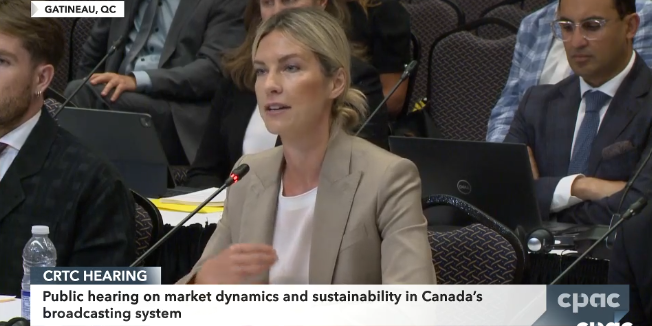

CAB local news plan draws support from industry, jeers from music firms
Broadcast | | January 6, 2025
The Canadian Association of Broadcasters (CAB) has submitted a proposal to the CRTC that would see funding go to radio stations outside major cities for the purpose of boosting and/or maintaining local news programming. Interventions and replies have been submitted to the commission for its consultation.
The CAB is suggesting it act as the administrator of the Commercial Radio News Fund (CRNF) in which base contributions will be allotted to radio stations outside of Montreal, Toronto, Vancouver, Calgary, Edmonton, and Ottawa-Gatineau. Those stations would use the fund to broadcast local news.
In its initial comment, the association changed its proposal of monthly payouts to a twice-yearly schedule. It also wants to base payments on a station’s expenditures for the previous year. Using the original idea of contributions being available by Aug. 31 of this year would delay payments of the latter half of the broadcast year until January 2026, it said. It also wants the fund to be permanent rather than a temporary measure.
While broadcasters hurried to endorse the CAB plan, with a handful submitting identically-worded interventions to the CRTC, music industry groups opposed the suggestion. The Canadian Independent Music Association (CIMA) was one of them.
“Centrally, CIMA wishes to state that we do not support the creation of a fund to support local news programming on commercial radio stations emanating from initial base contributions resulting from the Online Streaming Act,” it wrote. “We fundamentally believe that financial contributions from platforms whose business models primarily revolve around streaming music should go exclusively to existing funds within the music sector.”
“Local radio news undoubtedly provides an important service to surrounding communities,” Music Canada stated in its comment. “But the public value of local news does not justify the significant subsidy of commercial radio stations by licensed music streaming platforms – particularly at a rate approximately three times that paid by licensed commercial radio stations to Canadian Content Development [CCD] contributions.”
The Digital Media Association (DiMA) suggested the CAB does not have the necessary structure to administer the CRNF. It is calling for the establishment of a not-for-profit organization to oversee the fund. The CAB rejected that call in its Dec. 19 reply comments.
“The sort of formal governance proposed by DiMA (and Music Canada) is completely unnecessary,” the association asserted.
Friends of Canadian Media (FoCM) endorsed the idea of CAB running the fund.
“With its track record in administering the ILNF [Independent Local New Fund] and Covid Relief funds, the CAB has already demonstrated its ability to act as a competent, impartial and efficient CRNF administrator,” the lobby group said. “FoCM accordingly sees no basis for introducing new governance, accountability requirements, or onerous reporting.”
The Forum for Research and Policy in Communications (FRPC) looked at the CAB’s 10-member CEO Radio Council, and found it wanting.
“None of its members, for instance, is a single-station CEO,” the FRPC stated. “Nor is the council reflective of Canadians in general: none of its members come from Canada’s territories or the five provinces east of Ontario, for instance, and all are male. It is unclear if any of the members are bilingual or originate from Quebec.”
In its initial questions laid out in the consultation notice, the commission asked if recipients of the CRNF should be members of the Canadian Broadcast Standards Council (CBSC). The Ontario Association of Broadcasters (OAB) enthusiastically endorsed the proposal.
“Membership in an independent CBSC would ensure that those receiving funds adhere to the highest journalistic standards,” the OAB wrote on Dec. 3. “The CBSC board is not government appointed and the CBSC is not a fund administrator. This ensures journalistic independence and eliminates any appearance of a quid pro quo related to news coverage.”
There have been suggestions that the government’s Local Journalism Initiative and labour tax credits for print media have threatened journalistic independence.
Stingray Group Inc. said the situation is dire for private radio in this country, and that it is only getting worse.
“According to CRTC data, private radio’s total advertising revenue in 2013 was $1.60 billion, declining to $1.43 billion in 2019,” the streaming service stated. “The next year, the pandemic impact took that number down to $1.09 billion, and it was lower than that in each of 2021, 2022, and 2023. Based on industry tracking data, it appears that the advertising revenue for private radio was also flat or slightly lower in 2024.”
Golden West Broadcasting Ltd. welcomed the CAB proposition. The prairie broadcast group vowed to expand local news coverage if granted CRNF money, to invest in news-gathering equipment and infrastructure, to provide added training for staff, and to upgrade technical infrastructure to guarantee ongoing reliability.



